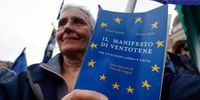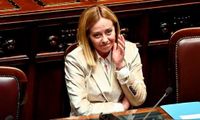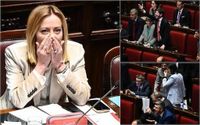In a highly charged session of the Chamber of Deputies on March 20, 2025, Italian Prime Minister Giorgia Meloni sparked outrage after she quoted the Ventotene Manifesto, stating, "I don't know if this is your Europe, but it certainly isn't mine." This remark ignited a chaotic atmosphere in the chamber, filled with shouting and protests from opposition members, some of whom called for Meloni to apologize.
The Ventotene Manifesto, originally penned in 1941 by Altiero Spinelli and Ernesto Rossi while they were political prisoners under the fascist regime, has been recognized as a foundational text for European unity and integration. During her address, Meloni focused on selected excerpts that referenced the abolition of private property, framing them in a modern context that many members of the opposition found inflammatory.
Following the uproar, Meloni defended her remarks on social media, accusing those who invoked the manifesto during a recent pro-European demonstration in Rome of not having read it. "A text can be distributed but not read?" she contended. "I didn't distort it; I read it. It’s only offensive if you leave out context. The manifesto was distributed this past Saturday—its relevance today must be questioned accordingly."
The exchange reached a boiling point when the president of the chamber, Lorenzo Fontana, suspended the session several times due to the escalating uproar. Opposition leaders, including Democrats and representatives from other parties, vehemently criticized Meloni, saying she had disgraced the historical significance of the manifesto. Federico Fornaro from the Democratic Party demanded that Meloni "kneel before these men and women, rather than ridicule them," capturing the sustained anger from the opposition faction.
Meloni's comments have led to accusations that she misrepresented the manifesto's core values, which advocate for a united Europe through federal principles. Critics note that she has not fully captured the spirit of the manifesto, which calls for abandoning the sovereign nation-state concept in favor of a collective European identity. This divergence showcases Meloni's ideological stance against the backdrop of rising nationalism across Europe—a perspective that often clashes with the foundational ideals set forth by the manifesto.
In the aftermath of the incident, reactions from her government colleagues have been mixed. Antonio Tajani, for instance, defended Meloni, asserting that she had not insulted Spinelli and that the ensuing debate was overblown. Contrarily, Elly Schlein, the Democratic Party leader, attacked Meloni for, in her opinion, "outraging European memory. How can we ignore our history?"
This incident is not just a political skirmish; it reflects profound ideological divides regarding Europe's future direction and the legacy of its founding texts. Scholars and journalists have weighed in, positing that Meloni's reading might reflect her party's broader agenda, which has previously critiqued what they view as failures of the European Union and the Euro. Her statements echo sentiments expressed in the manifesto of the 'Europa dei popoli,' which her party, Fratelli d’Italia, presented on March 25, 2017. That manifesto characterized the EU as a "failed experiment" and vehemently opposed the euro as a currency.
In a deeper analysis, some commentators have pointed to a disconnect between Meloni’s interpretation of the manifesto and its historical context. It was originally aimed against the kinds of nationalistic sentiments that her party has espoused. In a telling statement, Pierluigi Battista, a journalist, affirmed Meloni's position, arguing that the manifesto does advocate for a form of governance that indeed is illiberal in nature. He referenced specific lines where the authors expressed doubts about the populace's maturity, implying that a different kind of governance—one not reliant on broad democratic input—was necessary in times of upheaval.
While Meloni appeared to leverage the manifesto to criticize her political opponents, the ensuing dialogue has opened a broader discourse about the role of foundational texts in modern politics. Political leaders and historians alike are now grappling with how Meloni's interpretation resonates within the complexities of contemporary European politics. The situation remains volatile, emphasizing the need for a clearer understanding of historical documents that shaped Europe's integrative journey.
Looking forward, it remains to be seen how this incident will influence Meloni's standing within the European landscape and her party's approach in the context of ongoing debates about national sovereignty versus cooperative governance among EU member states. As tensions rise, both within Italy and across Europe, the ideological battlegrounds are clearly drawn, revealing an urgent need for reflection on the principles that underpin European unity and identity.








